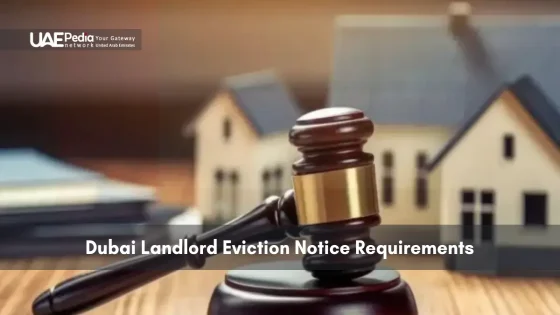What if navigating tenant evictions in the UAE wasn’t just about paperwork—but about cultural respect and legal precision? While rental markets here thrive, property owners must balance firmness with fairness under local regulations. Missing a single step could turn a straightforward process into a costly misstep.
Current UAE tenancy laws—like Law No. 33 of 2008 and Law No. 26 of 2007—require landlords to follow strict protocols. For example, every eviction notice must be notarized and delivered within specific timeframes. These rules protect both parties, ensuring no one faces sudden displacement without valid cause.
Recent updates reflect the Emirates’ commitment to modernizing real estate practices. Whether you’re managing a downtown apartment or a villa community, understanding these guidelines is non-negotiable. Proper documentation isn’t just a formality—it’s your legal armor.
Key takeaways:
- Valid eviction notices require formal notarization under UAE law
- Time-sensitive delivery protects tenants and landlords equally
- Updated regulations align with Dubai’s dynamic rental landscape
Understanding the Legal Framework for Eviction Notices in Dubai
Navigating rental laws here isn’t just about rules—it’s about building trust through transparent processes. The UAE’s system balances tradition with modern safeguards, guided by the Real Estate Regulatory Agency (RERA). Think of it as a safety net woven from cultural values and legal precision.
Where Old Meets New in Property Agreements
Law No. 33 of 2008 and Law No. 26 of 2007 work like puzzle pieces. The first outlines lease terms, while the second clarifies termination rights. Together, they ensure neither party gets blindsided. A valid tenancy contract acts as your roadmap—skip it, and you’re navigating desert dunes without a compass.
Seals, Stamps & Smart Moves
Ever seen a document stamped by a notary public? That golden seal transforms paper into legal armor. UAE law demands this step, plus sending notices via registered mail. One property owner learned this the hard way when their unsigned notice got tossed in court.
Grounds for action? Think non-payment for 30+ days or unauthorized sublets. But even with cause, rushing the process backfires. As RERA reminds us: “Haste breeds errors; patience builds cases.”
Insights into the dubai landlord eviction notice requirements
Crafting a valid eviction notice here feels like threading a needle—precision matters more than you’d think. Missing even one element could leave you stuck in legal sand. Let’s break down what transforms a simple letter into enforceable documentation.
A proper notice must include three non-negotiable elements: clear reasons for termination, exact property details, and notary verification. Unlike casual emails, this document demands formal Arabic/English bilingual formatting. We’ve seen cases where owners used Google Translate for clauses—only to face rejection in court.
| Component | Informal Notice | Legal Notice |
|---|---|---|
| Notarization | Optional | Mandatory |
| Language | Colloquial terms | RERA-approved phrases |
| Delivery | Text/email | Registered mail + SMS |
| Property Use | Vague descriptions | Unit number + community |
Why does “notice must” sound so rigid? Courts here treat these documents like architectural blueprints—every word holds structural importance. A 2023 case saw a tenant counter-sue successfully because the notice cited “improper use” without specifying how they violated the lease.
Pro tip: Always double-check clauses about using property for business or subletting. One landlord learned this hard truth when their tenant argued the notice didn’t reference the exact lease section breached. As RERA advisors often say: “Assume every period is a landmine—step carefully.”
Legal Grounds for Issuing an Eviction Notice
Imagine your rental property as a carefully balanced ecosystem—when one element shifts, the whole structure needs adjustment. UAE law recognizes two primary scenarios where removing occupants becomes necessary: tenant missteps or owner priorities. Let’s unpack these situations like a local market vendor sorting spices—methodically and with clear intent.
When Tenants Cross the Line
Article 25(1) acts like a referee’s whistle for lease violations. Common triggers include:
- Missed payments beyond 30 days (even partial defaults count)
- Unauthorized sublets—like discovering Airbnb guests in your furnished apartment
- Property damage resembling a sandstorm’s aftermath
A 2022 ruling saw an owner successfully reclaim their unit after proving repeated noise complaints. But courts demand proof—think timestamped videos or neighbor testimonies.
Owners’ Life Changes Matter Too
Article 25(2) lets you reclaim spaces for personal milestones. Valid reasons include:
- Moving family into the property (no “ghost relatives” allowed)
- Selling to a buyer who wants vacant possession
- Renovations requiring permits—like adding earthquake-resistant beams
One case involved a landlord who needed 8 months for structural upgrades. Their 12-month notice gave the tenant ample relocation time, avoiding disputes.
Pro tip: Always issue written warnings first—like a yellow card before the red. As legal advisors often say: “Documentation is the bridge between frustration and resolution.”
Step-by-Step Guide to Drafting an Eviction Notice
Creating a legally sound eviction document resembles following a cherished family recipe—skip one ingredient, and the whole dish falls flat. Let’s walk through each stage with the care of a goldsmith crafting filigree.
Gather Your Toolkit
Start by collecting every paper trail related to the lease. Essential items include:
- Ejari-registered tenancy contract
- Title deed proving owner status
- Payment records showing defaults (if applicable)
Think of these as your legal spices—each adds flavor to your case. A 2023 dispute highlighted how missing Ejari paperwork delayed proceedings by 4 months.
Crafting the Notice
Your document must include:
- Exact lease start/end dates
- Tenant’s full legal name
- Specific breach details (e.g., “60 days unpaid rent”)
Use RERA-approved phrases instead of casual language. One property manager learned this when their notice used “didn’t pay” instead of “failed to remit due amounts.”
Dual-language formatting? It’s like wearing both a seatbelt and helmet—optional but wise. Courts accept English notices, but Arabic translations prevent misunderstandings.
Seal It Right
Partner with a notary public early. They’ll check for:
- Proper witness signatures
- Accurate calendar references
- Alignment with UAE Civil Code Article 25
As legal advisor Fatima Al-Mazroui notes: “A notary’s stamp turns words into weapons—sharp, precise, and undeniable.” This step transforms your draft from suggestion to mandate.
Proper Procedures for Issuing and Serving the Notice
Think of serving legal documents like sending a fragile package—every layer of protection matters. The UAE’s system combines traditional verification methods with modern tracking to ensure no step gets lost in transit.
Role of Notary Public in Formalizing the Notice
A notary public registered service acts as your legal witness—like having a trusted friend verify your handshake deal. These professionals do more than stamp papers. They:
- Confirm your identity and property ownership
- Ensure the notice aligns with Article 25 requirements
- Create an official record for future reference
Local providers like Dubai Notary Hub offer same-day appointments to streamline the process. Regular notary services differ—registered ones file documents in government databases, creating an unbreakable paper trail.
| Service Type | Basic Notary | Public Registered |
|---|---|---|
| Legal Weight | Temporary validity | Permanent record |
| Database Entry | No | Yes |
| Dispute Resolution | Limited use | Court-admissible |
Using Registered Mail for Proof of Receipt
Registered mail transforms “I sent it” into “Here’s the proof.” Emirates Post’s tracking system provides:
- Digital timestamps of delivery attempts
- Recipient signature confirmation
- SMS alerts to both parties
One property owner avoided a messy case by presenting their mail receipt—showing the tenant received three reminders. As legal advisor Khalid Al-Mansoori notes: “That green slip isn’t just paper—it’s your courtroom armor.”
Skip these steps, and you’re building a house on sand. Combine notary public registered validation with tracked delivery, and your notice becomes a fortress—legally solid and dispute-proof.
Timeframes and Notice Periods for Eviction
Timing in property disputes works like a desert caravan’s schedule—miss a checkpoint, and the whole journey unravels. UAE law sets clear time boundaries for reclaiming spaces, whether you’re moving family in or addressing lease breaches. Let’s map these deadlines with the precision of a sundial.
Standards for 12-Month Notices in Case of Personal Use or Sale
Need the property back for relatives or a sale? The law grants tenants a full 12-month period to relocate. This buffer mirrors cultural values of stability—like giving guests ample time to finish their gahwa before departing. Key points:
- Notices must specify exact reasons (e.g., “son’s wedding” or “pending sale”)
- Start the countdown from the next rent due date
- Include notarized proof like family visa copies
A 2023 case saw a tenant win compensation because the owner cited “personal use” without providing relocation plans. As legal advisors say: “Generosity in time demands clarity in intent.”
Shorter Notice Periods for Lease Violations
When tenants breach agreements, the clock ticks faster. Serious issues like unpaid rent or illegal sublets allow 30-day notices. Think of it as an emergency brake—swift but measured. Essentials include:
- Documented proof (bank statements, neighbor testimonies)
- Formal warnings sent before the final notice
- Registered delivery confirming receipt
| Notice Type | Time Required | Key Reasons | Documentation Needs |
|---|---|---|---|
| Personal Use/Sale | 12 months | Family relocation, property sale | Notarized letter, title deed |
| Lease Breach | 30 days | Non-payment, unauthorized use | Ejari contract, payment records |
Pro tip: Sync deadlines with the tenancy cycle. Serving notices mid-lease? Courts may dismiss them if they don’t align with renewal dates. One owner avoided this pitfall by setting calendar alerts 90 days before each contract year ends.
Imagine setting reminders like you would for a desert expedition—water, maps, time checks. Apps like RERA’s Dubai REST help track critical dates, turning legal countdowns into manageable steps. Miss a deadline, and you’re back to square one—no matter how valid your reasons.
Guidelines for Avoiding Common Documentation Errors
Think of legal documents as intricate puzzles—missing one piece and the whole picture collapses. Even minor slip-ups can turn straightforward processes into months-long disputes. Let’s explore how to assemble paperwork that withstands scrutiny.
Spotting Hidden Traps in Paperwork
Top errors include mismatched dates, unsigned pages, and informal language. A 2023 survey found 40% of rejected notices had incorrect rent amounts or property IDs. Why does this matter? Courts view these slips as cracks in your case’s foundation.
| Error Type | Risk Level | Quick Fix |
|---|---|---|
| Missing Notary Stamp | High | Use RERA-approved services |
| Vague Breach Descriptions | Medium | Reference exact lease clauses |
| Outdated Tenant Info | Critical | Cross-check Ejari records |
Legal advisor Amal Khalid warns: “A typo in the contract isn’t just a mistake—it’s an open door for challenges.” Tools like the Dubai Land Department’s Smart Owner app auto-fill 80% of fields, reducing human error.
- Triple-check tenant names against Emirates IDs
- Align termination dates with the tenancy cycle
- Save digital copies with version timestamps
Pro tip: Treat every document like a passport application—precision isn’t optional. Apps like Bayut Pro offer templates that auto-update with current laws. Remember: Clear paperwork protects everyone’s rights while keeping disputes out of sandstorms.
Managing Tenant Interactions and Responses
Navigating tenant communications during legal processes is like using a GPS tracker—every signal matters, and missed check-ins create detours. Clear records turn tense conversations into structured pathways, protecting everyone involved.
Turning Words Into Shields
Always notify tenant parties in writing—even friendly chats need follow-up emails. A 2022 dispute saw a property owner win their case because they’d saved WhatsApp messages showing rent reminders. As legal advisor Layla Al-Haddad notes: “Screenshots today prevent courtroom headaches tomorrow.”
Use this three-step approach:
- Send formal letters via registered mail (keep the green receipt)
- Follow up with dated emails summarizing phone calls
- Store files in cloud drives with timestamps
| Method | Proof Strength | Best For | Risk Level |
|---|---|---|---|
| Medium | Routine updates | Low | |
| Registered Mail | High | Legal notices | Critical |
| In-Person | Low | Informal chats | High |
If a tenant fails to respond, document every attempt. One manager avoided fines by showing delivery confirmations for three notices sent over 45 days. Tools like Rentlio auto-log interactions, creating audit-ready trails.
Stay professional—avoid emotional language. A simple “Per our lease Section 4B…” works better than accusations. Remember: Your files aren’t just paper—they’re your voice if disputes arise.
Integrating Market Trends and Mortgage Considerations
Owning rental property works like a financial heartbeat—skip a beat, and the whole system falters. Rising rent prices and shifting property values directly impact when owners consider reclaiming spaces. Let’s explore how numbers tell stories beyond legal paperwork.
When Numbers Demand Action
Imagine your mortgage payment as a compass guiding decisions. A 15-year loan at AED 2M costs roughly AED 7,500 monthly. If rent income hits AED 12,000, that’s a AED 4,500 cushion. But if rates climb to AED 15,000? Suddenly, keeping reliable tenants outweighs short-term gains.
| Mortgage Term | Monthly Payment | Avg. Rent Income | Profit Margin |
|---|---|---|---|
| 10 Years | AED 9,650 | AED 12,000 | AED 2,350 |
| 15 Years | AED 7,500 | AED 12,000 | AED 4,500 |
Market surges tempt some to reclaim units for resale. One owner sold their villa after values jumped 22% in 18 months—but only after ensuring their notice period aligned with mortgage terms. As financial advisor Rania Faisal notes: “Profit whispers, but debt screams—balance both voices.”
- Rising rent rates may justify keeping tenants long-term
- Shorter mortgage terms increase pressure for stable occupancy
- Property value spikes often trigger sales requiring vacant units
Smart investors track trends like desert scouts reading dunes. Apps like Property Monitor analyze local data, showing when evicting for renovations could boost returns by 30%. But remember: Legal compliance remains your anchor—even golden opportunities sink without proper documentation.
Pro tip: Consult a financial advisor before timing notices with market shifts. They’ll help weigh mortgage cliffs against rent projections, turning spreadsheets into strategy. Because here, math isn’t just numbers—it’s the language of sustainable growth.
Best Practices for a Smooth Eviction Process
Imagine managing property transitions like calibrating a GPS—every turn requires real-time data and clear directions. Modern tools and updated knowledge help avoid detours while maintaining respectful relationships. Here’s how to navigate this terrain without burning bridges.
Smart Tech for Smarter Management
Platforms like Keyper act as digital co-pilots, tracking deadlines and storing documents securely. Features include:
- Automated alerts for renewal dates and payment defaults
- Cloud-based record-keeping with timestamped interactions
- Template libraries for notices aligned with RERA guidelines
One property owner reduced errors by 70% after switching from spreadsheets to automated systems. As tech advisor Faris Al-Mazroui notes: “Digital tools don’t replace expertise—they amplify it.”
Regulations: The Moving Target
Subscribe to RERA’s newsletter and set quarterly calendar reminders for legal updates. Recent changes include:
| Year | Update Focus | Impact |
|---|---|---|
| 2022 | Digital notarization | Faster processing |
| 2023 | Grace period extensions | Tenant protections |
Review lease terms annually—especially clauses about rent adjustments and subletting. A 2024 case saw a landlord lose a dispute because their contract referenced outdated penalty rates.
Pro tip: Balance firmness with empathy. Send reminders via multiple channels and offer payment plans when possible. Legal advisor Mariam Khalid advises: “Treat tenants as partners, not adversaries—it’s cheaper than court.” Pair tech efficiency with human understanding, and you’ll steer clear of most storms.
Closing Insights on Navigating Dubai Eviction Procedures
Finalizing tenancy transitions resembles closing a complex mosaic—each legal tile must align perfectly. Property owners must follow multi-step protocols, from drafting notices to securing notary stamps. Missing one piece risks unraveling the entire process under UAE law.
Key steps include using registered mail for delivery proof and verifying reasons like personal use or family needs. Timelines matter—whether addressing lease breaches in 30 days or planning sales requiring 12-month notices. Documentation acts as both shield and compass here.
Challenges like tenant disputes demand clear records and neutral communication. Tools like digital trackers and RERA-approved templates help avoid pitfalls. Remember: Properly notarized papers and precise contract references turn intentions into enforceable actions.
When conflicts arise, seek resolution through authorized channels rather than shortcuts. Factors like first-degree relatives’ housing needs or mortgage terms add layers to each case. With updated legal knowledge and respectful practices, owners can navigate these waters confidently—turning potential storms into smooth sailings.
Law No. 33 of 2008 (UAE Civil Code) and Law No. 26 of 2007 (Dubai Rental Law) outline rights for both parties. These laws define valid eviction reasons, notice periods, and required documentation steps to keep everyone protected.
Landlords must provide a 12-month written notice via notary public and registered mail. The law requires proof that the owner or first-degree relatives will occupy the unit for at least two years after eviction.
Yes, but only after giving 12 months' notice and ensuring the sale isn’t a pretext for raising rents. The new owner must honor existing contracts unless they also intend to use the property personally.
Absolutely! A notary public must certify the notice to make it legally valid. Skipping this step could void the eviction process, even if the tenant received the document.
Sending the notice via registered mail with delivery confirmation creates a paper trail. Courts accept this as proof of proper service, even if the recipient avoids direct receipt.
Yes. If a tenant fails to pay rent for 30+ days, landlords can issue a 30-day notice. However, you must first send a payment reminder and allow a grace period before escalating.
Missing notary stamps, unclear reason codes (like “personal use” vs. “renovation”), or expired RERA registration numbers often cause hiccups. Always triple-check dates and legal references!
Keep all communication written—emails, WhatsApp messages, or letters. If disputes arise, these records strengthen your case in Dubai Rental Dispute Center hearings.
Sometimes. If a property has an active mortgage, lenders may require proof of rental income stability. Sudden evictions could affect loan terms, so consult your bank before proceeding.
Dubai’s REST app and RERA’s official website provide real-time updates. Many owners also hire registered property managers to handle notices, inspections, and legal filings seamlessly.



















